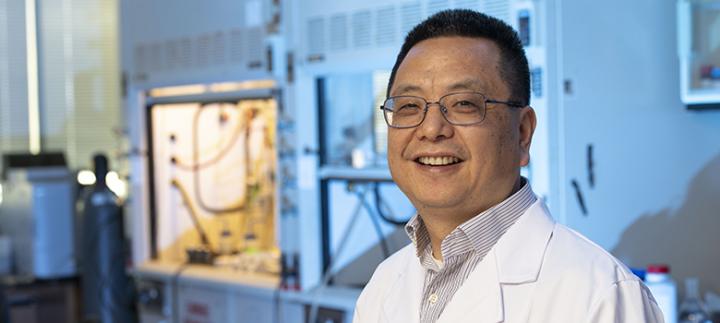Innovator of MOF sieve to reduce hydrocarbons in plastics wins recognition

Credit: Photo Courtesy of UTSA
(San Antonio, March 25, 2019) — Banglin Chen, Ph.D., a highly prolific chemistry researcher at The University of Texas at San Antonio (UTSA), has been awarded the distinguished Humboldt Research Award. The award recognizes a researcher’s entire achievements to date and is granted to academics whose fundamental discoveries, new theories and insights have had a significant impact on their own discipline, and who are expected to continue producing cutting-edge achievements in the future.
Chen, the Dean’s Distinguished Chair Professor of Chemistry, arrived at UTSA in 2009 and credits the warm weather, tenure position and a beautiful city of San Antonio as convincing his family to make the move. He was born in Zhejiang, China and studied in China and Singapore. He also worked with researchers Omar M. Yaghi at the University of Michigan, Stephen Lee at Cornell University and Andrew W. Maverick at Louisiana State University as a postdoctoral fellow (2000-2003) before joining the faculty at UT-Pan American in 2003.
Since arriving at UTSA, Chen has won a series of recognitions for his research. In 2011, he was ranked as one of the top 100 chemists over the past decade based on his citation impact factor. Each year, from 2014 to 2018, he was chosen as a highly cited researcher by Thomson Reuters and Clarivate Analytics. He was also spotlighted in The World’s Most Influential Scientific Minds 2014-2018 by Thomson Reuters and is on the 2016 List of Most Cited Researchers in Materials Science and Engineering by Elsevier Scopus Data.
As a Humboldt recipient, Chen will visit several institutions in Germany this summer to initiate long-term collaborations with scientists in the nation, particularly Stefan Kaskel, whom he has known for 10 years. Kaskel, who is based at Technische Universitat Dresden, nominated Chen for the Humboldt Award and will serve as his Humboldt host professor.
Each morning, Chen awakes with excitement to work with his students at UTSA and make new discoveries.
“UTSA has given us the freedom and environment to fully develop our ongoing research, particularly through the Welch research grant,” he said. “My colleagues, administrative staff and research officials, particularly Mary Riedel and Neal A. Guentzel, are very friendly and supportive.”
Chen’s work on gas storage, gas separation, photonics, sensing and heterogeneous catalysis has been published over 40,000 times in close to 300 peer-reviewed articles and books with citations. His work has been published in Science, Nature Materials, Nature Energy, Advanced Materials, Energy and Environmental Science and other top journals.
The chemist’s current research goal is to develop membranes and to commercialize materials for large scale gas separations. For example, a material termed UTSA-280 [Ca(C4O4)(H2O)]xH2O can be straightforwardly synthesized at a large scale in water from sodium squarate and Ca(NO3)28*4H2O. This material is very stable in the air and under water moisture. It shows highly selective sieving separation for ethylene/ethane.
“Metal-organic frameworks are very promising materials for gas storage and gas separation at a lower energy and economic cost,” said Chen.
Michael Doyle, the Rita and John Feik Distinguished University Chair in Medicinal Chemistry, has mentored Chen during their time together at UTSA.
“The importance of metal-organic frameworks is likely to be recognized by a Nobel Prize in the near future, and Professor Chen will be one of those in the pool of scientists who are the leaders in the development of this important technology,” said Doyle. “His contributions are recognized nationally and internationally, and they bring a heightened visibility to the role taken by UTSA in advancing science and technology.”
When Chen and Kaskel collaborate this summer, they will examine flexible metal-organic frameworks for gas separation and storage and for energy transformation.
In a nutshell, Chen’s goal is to discover some basic chemistry and materials that can benefit society.
###
Media Contact
Milady Nazir
[email protected]
Original Source
https:/



